
AMD Ryzen 7 5800X Benchmark, Test and specs
Last updated:
The AMD Ryzen 7 5800X was released in Q4/2020 and has 8 cores. The processor can process 16 threads simultaneously and uses a mainboard with the socket AM4 (PGA 1331). In the Geekbench 5 benchmark, the AMD Ryzen 7 5800X achieved a result of 1,728 points (single-core) or 11,465 points (multi-core).
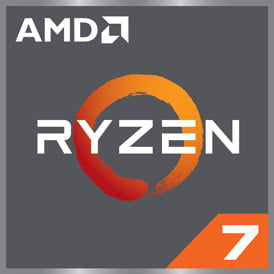
| Name: | AMD Ryzen 7 5800X |
|---|---|
| Family: | AMD Ryzen 7 (67) |
| CPU group: | AMD Ryzen 5000 (12) |
| Architecture: | Vermeer (Zen 3) |
| Segment: | Desktop / Server |
| Generation: | 4 |
| Predecessor: | AMD Ryzen 7 3800X |
| Successor: | -- |
CPU Cores and Base Frequency
The AMD Ryzen 7 5800X has 8 cores. The clock frequency of the AMD Ryzen 7 5800X is 3.80 GHz (4.70 GHz). An initial performance assessment can be made using the number of CPU cores.
| CPU Cores / Threads: | 8 / 16 |
|---|---|
| Core architecture: | normal |
| Cores: | 8x |
| Hyperthreading / SMT: | Yes |
|---|---|
| Overclocking: | Yes |
| Frequency: | 3.80 GHz |
| Turbo Frequency (1 Core): | 4.70 GHz |
| Turbo Frequency (8 Cores): | 4.40 GHz |
Memory & PCIeThe AMD Ryzen 7 5800X supports a maximum of 128 GB memory. Depending on the mainboard, the processor can use a maximum of 2 (Dual Channel) memory channels. This results in a maximum bandwidth of the main memory of 51.2 GB/s. |
|
| Memory type: | Memory bandwidth: |
|---|---|
| DDR4-3200 | 51.2 GB/s |
| Max. Memory: | 128 GB |
| Memory channels: | 2 (Dual Channel) |
| ECC: | Yes |
| PCIe: | 4.0 x 20 |
| PCIe Bandwidth: | 39.4 GB/s |
Thermal ManagementThe AMD Ryzen 7 5800X has a TDP of 105 W. Based on the TDP, the system manufacturer can and must adapt the cooling solution to the processor. |
|
|---|---|
| TDP (PL1 / PBP): | 105 W |
| TDP (PL2): | -- |
| TDP up: | -- |
| TDP down: | -- |
| Tjunction max.: | 90 °C |
Technical details
Modern production reduces the waste heat of a processor and increases its efficiency. The AMD Ryzen 7 5800X is made in 7 nm and has 36.00 MB cache.
| Technology: | 7 nm |
|---|---|
| Chip design: | Chiplet |
| Socket: | AM4 (PGA 1331) |
| L2-Cache: | 4.00 MB |
| L3-Cache: | 32.00 MB |
| AES-NI: | Yes |
| Operating systems: | Windows 10, Windows 11, Linux |
| Virtualization: | AMD-V, SVM |
|---|---|
| Instruction set (ISA): | x86-64 (64 bit) |
| ISA extensions: | SSE4a, SSE4.1, SSE4.2, AVX2, FMA3 |
| Release date: | Q4/2020 |
| Release price: | 449 $ |
| Part Number: | -- |
| Documents: | Technical data sheet |
Rate this processor
Benchmark results

The benchmark results for the AMD Ryzen 7 5800X have been carefully checked by us. We only publish benchmark results that have been created by us or that have been submitted by a visitor and then checked by a team member. All results are based on and fullfill our benchmark guidelines.
Screenshots:
Screenshots:
- Cinebench R23 (32GB DDR4-3600 CL16), Windows 10 Pro
- Cinebench R23 (16GB Ram), Windows 10
- Geekbench 5.4.4 on MSI MAG B550M MORTAR WIFI (32 GB DDR4-3733), Windows 10
- Cinebench R23 (64 GB DDR4-3600), Windows 11 [Overclocked]
Cinebench 2024 (Single-Core)
The Cinebench 2024 benchmark is based on the Redshift rendering engine, which is also used in Maxon's 3D program Cinema 4D. The benchmark runs are each 10 minutes long to test whether the processor is limited by its heat generation.

|
AMD Ryzen 3 8300G
4C 8T @ 4.90 GHz |
||

|
AMD Ryzen 3 PRO 8300G
4C 8T @ 4.90 GHz |
||

|
Intel Core i5-12500
6C 12T @ 4.60 GHz |
||
|
|
AMD Ryzen 7 5800X
8C 16T @ 4.70 GHz |
||

|
AMD Ryzen 5 PRO 7645
6C 12T @ 5.10 GHz |
||

|
AMD Ryzen 5 7600
6C 12T @ 5.10 GHz |
||

|
AMD Ryzen 7 5800X3D
8C 16T @ 4.50 GHz |
||
Cinebench 2024 (Multi-Core)
The Multi-Core test of the Cinebench 2024 benchmark uses all cpu cores to render using the Redshift rendering engine, which is also used in Maxons Cinema 4D. The benchmark run is 10 minutes long to test whether the processor is limited by its heat generation.

|
Intel Core i5-12600K
10C 16T @ 4.90 GHz |
||

|
Intel Core i5-12600KF
10C 16T @ 4.90 GHz |
||

|
Intel Core i5-14500HX
14C 20T @ 4.90 GHz |
||
|
|
AMD Ryzen 7 5800X
8C 16T @ 4.70 GHz |
||

|
AMD Ryzen 5 7600X
6C 12T @ 5.30 GHz |
||

|
Intel Core i5-13500HX
14C 20T @ 4.70 GHz |
||

|
AMD Ryzen 7 PRO 8840HS
8C 16T @ 5.10 GHz |
||
Cinebench R23 (Single-Core)
Cinebench R23 is the successor of Cinebench R20 and is also based on the Cinema 4 Suite. Cinema 4 is a worldwide used software to create 3D forms. The single-core test only uses one CPU core, the amount of cores or hyperthreading ability doesn't count.

|
Intel Core i5-12400
6C 12T @ 4.40 GHz |
||

|
Intel Core i5-12400F
6C 12T @ 4.40 GHz |
||

|
AMD Ryzen 9 5900
12C 24T @ 4.70 GHz |
||
|
|
AMD Ryzen 7 5800X
8C 16T @ 4.70 GHz |
||

|
AMD Ryzen 7 PRO 6860Z
8C 16T @ 4.73 GHz |
||

|
AMD Ryzen 7 5800
8C 16T @ 4.60 GHz |
||

|
AMD Ryzen 5 5600X
6C 12T @ 4.60 GHz |
||
Cinebench R23 (Multi-Core)
Cinebench R23 is the successor of Cinebench R20 and is also based on the Cinema 4 Suite. Cinema 4 is a worldwide used software to create 3D forms. The multi-core test involves all CPU cores and taks a big advantage of hyperthreading.

|
Intel Core i5-13400
10C 16T @ 4.10 GHz |
||

|
Intel Core i7-12700H
14C 20T @ 3.80 GHz |
||

|
AMD Ryzen 5 7600X
6C 12T @ 5.30 GHz |
||
|
|
AMD Ryzen 7 5800X
8C 16T @ 4.40 GHz |
||

|
AMD Ryzen 7 5800X3D
8C 16T @ 4.20 GHz |
||

|
Intel Core i5-13500H
12C 16T @ 4.40 GHz |
||

|
Apple M3 Pro (12-CPU 18-GPU)
12C 12T @ 3.80 GHz |
||
Geekbench 5, 64bit (Single-Core)
Geekbench 5 is a cross plattform benchmark that heavily uses the systems memory. A fast memory will push the result a lot. The single-core test only uses one CPU core, the amount of cores or hyperthreading ability doesn't count.

|
Intel Xeon W-1370
8C 16T @ 5.10 GHz |
||

|
Intel Xeon w9-3495X
56C 112T @ 4.80 GHz |
||

|
Intel Xeon W-1350P
6C 12T @ 5.10 GHz |
||
|
|
AMD Ryzen 7 5800X
8C 16T @ 4.70 GHz |
||

|
Intel Core i5-1350P
12C 16T @ 4.70 GHz |
||

|
AMD Ryzen 9 5900X
12C 24T @ 4.80 GHz |
||

|
Intel Xeon E-2356G
6C 12T @ 5.00 GHz |
||
Geekbench 5, 64bit (Multi-Core)
Geekbench 5 is a cross plattform benchmark that heavily uses the systems memory. A fast memory will push the result a lot. The multi-core test involves all CPU cores and taks a big advantage of hyperthreading.

|
Intel Core i9-7920X
12C 24T @ 3.70 GHz |
||

|
Intel Xeon W-2170B
14C 28T @ 3.60 GHz |
||

|
Intel Xeon Gold 6246
12C 24T @ 3.70 GHz |
||
|
|
AMD Ryzen 7 5800X
8C 16T @ 4.40 GHz |
||

|
Intel Xeon Gold 6226
12C 24T @ 3.50 GHz |
||

|
AMD Ryzen 9 3900
12C 24T @ 3.10 GHz |
||

|
Intel Xeon E5-2698 v4
20C 40T @ 2.80 GHz |
||
Geekbench 6 (Single-Core)
Geekbench 6 is a benchmark for modern computers, notebooks and smartphones. What is new is an optimized utilization of newer CPU architectures, e.g. based on the big.LITTLE concept and combining CPU cores of different sizes. The single-core benchmark only evaluates the performance of the fastest CPU core, the number of CPU cores in a processor is irrelevant here.

|
Intel Xeon W-11855M
6C 12T @ 4.90 GHz |
||

|
Intel Core i5-11600K
6C 12T @ 4.90 GHz |
||

|
Intel Core i5-11600KF
6C 12T @ 4.90 GHz |
||
|
|
AMD Ryzen 7 5800X
8C 16T @ 4.70 GHz |
||

|
Intel Core i7-1255U
10C 12T @ 4.70 GHz |
||

|
Intel Core i3-13100T
4C 8T @ 4.20 GHz |
||

|
AMD Ryzen 9 5900
12C 24T @ 4.70 GHz |
||
Geekbench 6 (Multi-Core)
Geekbench 6 is a benchmark for modern computers, notebooks and smartphones. What is new is an optimized utilization of newer CPU architectures, e.g. based on the big.LITTLE concept and combining CPU cores of different sizes. The multi-core benchmark evaluates the performance of all of the processor's CPU cores. Virtual thread improvements such as AMD SMT or Intel's Hyper-Threading have a positive impact on the benchmark result.

|
Intel Core i5-13505H
12C 16T @ 4.40 GHz |
||

|
Intel Core i9-9960X
16C 32T @ 4.10 GHz |
||

|
Intel Core i9-10920X
12C 24T @ 4.40 GHz |
||
|
|
AMD Ryzen 7 5800X
8C 16T @ 4.40 GHz |
||

|
Intel Core i5-13600T
14C 20T @ 3.60 GHz |
||

|
Intel Xeon Gold 6154
18C 36T @ 3.20 GHz |
||

|
Intel Xeon W-2265
12C 24T @ 4.20 GHz |
||
Cinebench R20 (Single-Core)
Cinebench R20 is the successor of Cinebench R15 and is also based on the Cinema 4 Suite. Cinema 4 is a worldwide used software to create 3D forms. The single-core test only uses one CPU core, the amount of cores or hyperthreading ability doesn't count.

|
Intel Core i9-11900KB
8C 16T @ 5.30 GHz |
||

|
AMD Ryzen 9 5900X
12C 24T @ 4.80 GHz |
||

|
Intel Core i5-1235U
10C 12T @ 4.40 GHz |
||
|
|
AMD Ryzen 7 5800X
8C 16T @ 4.70 GHz |
||

|
AMD Ryzen 9 6900HS
8C 16T @ 4.60 GHz |
||

|
Intel Core i7-1260P
12C 16T @ 4.70 GHz |
||

|
Intel Core i7-11700KF
8C 16T @ 5.00 GHz |
||
Cinebench R20 (Multi-Core)
Cinebench R20 is the successor of Cinebench R15 and is also based on the Cinema 4 Suite. Cinema 4 is a worldwide used software to create 3D forms. The multi-core test involves all CPU cores and taks a big advantage of hyperthreading.

|
AMD Ryzen 9 6980HS
8C 16T @ 4.20 GHz |
||

|
AMD Ryzen 9 6980HX
8C 16T @ 4.40 GHz |
||

|
Intel Xeon W-3235
12C 24T @ 4.00 GHz |
||
|
|
AMD Ryzen 7 5800X
8C 16T @ 4.40 GHz |
||

|
AMD Ryzen 9 PRO 6950HS
8C 16T @ 4.20 GHz |
||

|
AMD Ryzen 9 PRO 6950H
8C 16T @ 4.20 GHz |
||

|
AMD Ryzen 9 6900HX
8C 16T @ 4.20 GHz |
||
Blender 3.1 Benchmark
In the Blender Benchmark 3.1, the scenes "monster", "junkshop" and "classroom" are rendered and the time required by the system is measured. In our benchmark we test the CPU and not the graphics card. Blender 3.1 was presented as a standalone version in March 2022.

|
AMD Ryzen 9 3900
12C 24T @ 3.10 GHz |
||
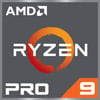
|
AMD Ryzen 9 PRO 3900
12C 24T @ 3.10 GHz |
||

|
Intel Xeon E5-2680 v4
14C 28T @ 2.70 GHz |
||
|
|
AMD Ryzen 7 5800X
8C 16T @ 4.40 GHz |
||

|
AMD Ryzen Threadripper 2920X
12C 24T @ 3.60 GHz |
||

|
AMD Ryzen 7 PRO 5750G
8C 16T @ 4.20 GHz |
||

|
AMD Ryzen 7 5700G
8C 16T @ 4.20 GHz |
||
Estimated results for PassMark CPU Mark
Some of the CPUs listed below have been benchmarked by CPU-monkey. However the majority of CPUs have not been tested and the results have been estimated by a CPU-monkey’s secret proprietary formula. As such they do not accurately reflect the actual Passmark CPU mark values and are not endorsed by PassMark Software Pty Ltd.

|
AMD EPYC 7401P
24C 48T @ 2.80 GHz |
||

|
Intel Core i7-12700E
12C 20T @ 4.00 GHz |
||

|
AMD Ryzen 7 5800X3D
8C 16T @ 4.20 GHz |
||
|
|
AMD Ryzen 7 5800X
8C 16T @ 4.40 GHz |
||

|
Intel Xeon W-2275
14C 28T @ 4.00 GHz |
||

|
Intel Core i9-10940X
14C 28T @ 4.20 GHz |
||

|
AMD Ryzen 5 PRO 7645
6C 12T @ 4.50 GHz |
||
CPU-Z Benchmark 17 (Single-Core)
The CPU-Z benchmark measures a processor's performance by measuring the time it takes the system to complete all benchmark calculations. The faster the benchmark is completed, the higher the score.

|
AMD Ryzen 9 7940HS
8C 16T @ 4.00 GHz |
||

|
AMD Ryzen 9 5900X
12C 24T @ 4.50 GHz |
||

|
Intel Core i7-11700K
8C 16T @ 4.50 GHz |
||
|
|
AMD Ryzen 7 5800X
8C 16T @ 4.40 GHz |
||

|
Intel Core i7-11700KF
8C 16T @ 4.50 GHz |
||

|
Intel Core i5-11600K
6C 12T @ 4.60 GHz |
||

|
AMD Ryzen 7 PRO 8845HS
8C 16T @ 4.25 GHz |
||
CPU-Z Benchmark 17 (Multi-Core)
The CPU-Z benchmark measures a processor's performance by measuring the time it takes the system to complete all benchmark calculations. The faster the benchmark is completed, the higher the score.

|
AMD Ryzen 7 7840HS
8C 16T @ 3.80 GHz |
||

|
Intel Core i5-14400
10C 16T @ 2.50 GHz |
||

|
Intel Core i5-14400F
10C 16T @ 2.50 GHz |
||
|
|
AMD Ryzen 7 5800X
8C 16T @ 3.80 GHz |
||

|
Intel Core i9-11900K
8C 16T @ 3.50 GHz |
||

|
Intel Core i9-9920X
12C 24T @ 3.50 GHz |
||

|
Intel Core i9-11900KF
8C 16T @ 3.50 GHz |
||
Cinebench R15 (Single-Core)
Cinebench R15 is the successor of Cinebench 11.5 and is also based on the Cinema 4 Suite. Cinema 4 is a worldwide used software to create 3D forms. The single-core test only uses one CPU core, the amount of cores or hyperthreading ability doesn't count.

|
Intel Core i5-12600K
10C 16T @ 4.90 GHz |
||

|
Intel Core i5-12600KF
10C 16T @ 4.90 GHz |
||

|
Intel Core i5-13500
14C 20T @ 4.80 GHz |
||
|
|
AMD Ryzen 7 5800X
8C 16T @ 4.70 GHz |
||

|
AMD Ryzen 9 5900X
12C 24T @ 4.80 GHz |
||

|
Apple M3 Max (16-CPU 40-GPU)
16C 16T @ 4.06 GHz |
||

|
Intel Core i7-1280P
14C 20T @ 4.80 GHz |
||
Cinebench R15 (Multi-Core)
Cinebench R15 is the successor of Cinebench 11.5 and is also based on the Cinema 4 Suite. Cinema 4 is a worldwide used software to create 3D forms. The multi-core test involves all CPU cores and taks a big advantage of hyperthreading.

|
Intel Core i9-12900H
14C 20T @ 3.80 GHz |
||

|
Intel Core i9-12900HK
14C 20T @ 3.80 GHz |
||

|
Intel Core i9-10850K
10C 20T @ 4.80 GHz |
||
|
|
AMD Ryzen 7 5800X
8C 16T @ 4.40 GHz |
||

|
Intel Core i5-12600KF
10C 16T @ 4.50 GHz |
||

|
Intel Core i5-12600K
10C 16T @ 4.50 GHz |
||

|
Intel Core i9-9940X
14C 28T @ 4.20 GHz |
||
CPU performance per watt (efficiency)
Efficiency of the processor under full load in the Cinebench R23 (multi-core) benchmark. The benchmark result is divided by the average energy required (CPU package power in watts). The higher the value, the more efficient the CPU is under full load.

|
Intel Core i5-13600K
24,125 CB R23 MC @ 174 W |
||

|
Intel Core i5-12500
12,974 CB R23 MC @ 94 W |
||

|
AMD Ryzen 5 5600G
10,202 CB R23 MC @ 74 W |
||
|
|
AMD Ryzen 7 5800X
15,228 CB R23 MC @ 119 W |
||

|
AMD Ryzen 7 7745HX
18,065 CB R23 MC @ 143 W |
||

|
Intel Core i9-12900KS
27,796 CB R23 MC @ 241 W |
||

|
Intel Core i9-12900KF
27,472 CB R23 MC @ 240 W |
||
Benchmarks

Cinebench 2024 (SC)
272 entries
272 entries

Cinebench 2024 (MC)
271 entries
271 entries

Cinebench R23 (SC)
586 entries
586 entries

Cinebench R23 (MC)
565 entries
565 entries

Geekbench 5 (SC)
2,488 entries
2,488 entries

Geekbench 5 (MC)
2,461 entries
2,461 entries

Geekbench 6 (SC)
1,755 entries
1,755 entries

Geekbench 6 (MC)
1,703 entries
1,703 entries

Cinebench R20 (SC)
656 entries
656 entries

Cinebench R20 (MC)
604 entries
604 entries

Blender 3.1 Benchmark
212 entries
212 entries

PassMark CPU-Mark
2,392 entries
2,392 entries

CPU-Z Benchmark 17 (SC)
231 entries
231 entries

CPU-Z Benchmark 17 (MC)
733 entries
733 entries

Monero Hashrate
94 entries
94 entries

V-Ray CPU-Render
249 entries
249 entries

Cinebench R15 (SC)
1,106 entries
1,106 entries

Cinebench R15 (MC)
1,101 entries
1,101 entries

CPU performance per watt (efficiency)
109 entries
109 entries
News and articles for the AMD Ryzen 7 5800X
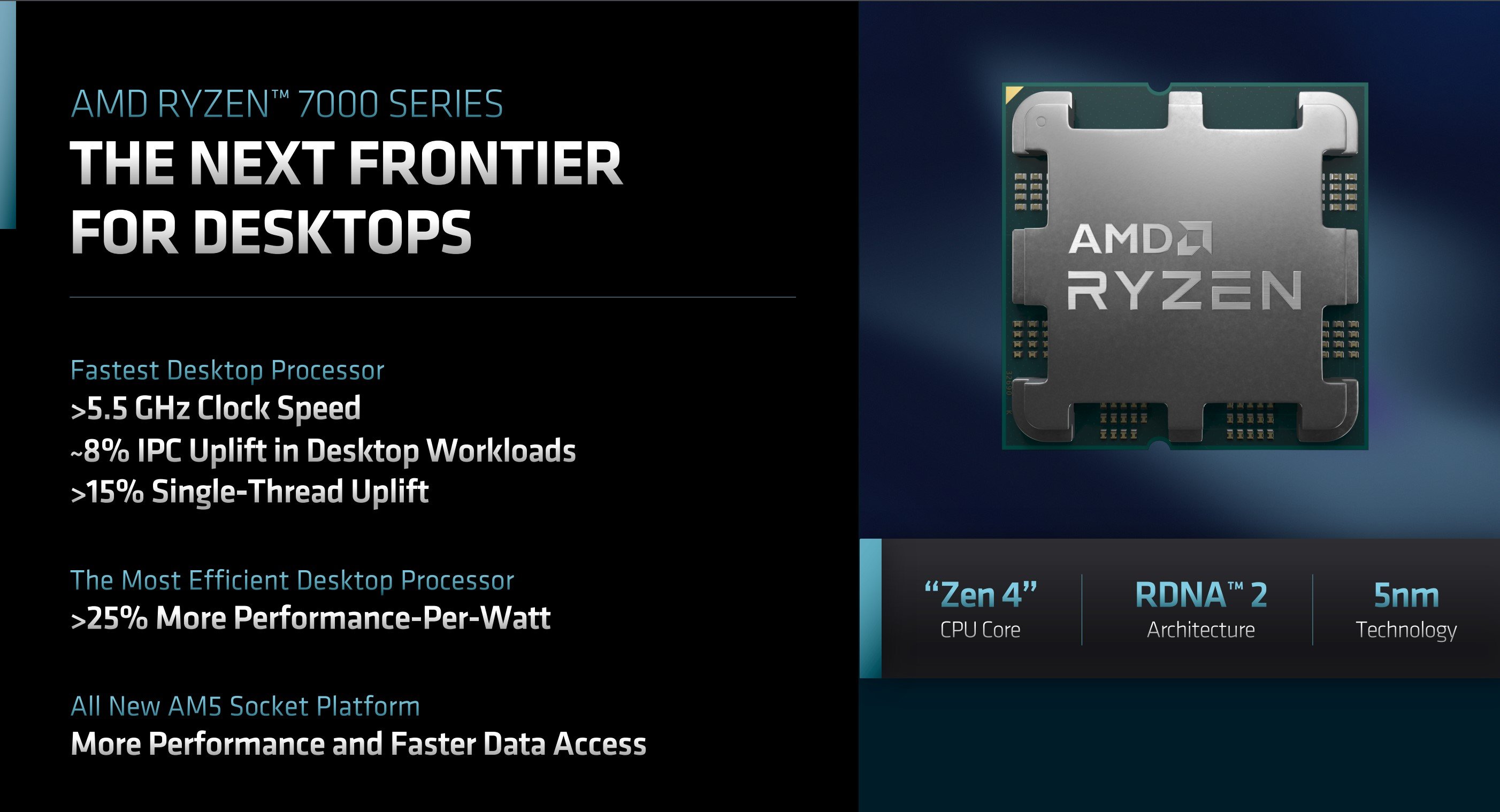
Why the new AMD Ryzen 7000 processors for the AM5 socket are currently not a good deal
Posted by Stefan on 2022-10-11
At the end of September 2022, the time had come: AMD presented its latest desktop processors called AMD Ryzen 7000. Initially, 4 processors with 6 to 16 CPU cores were released.
The new socket AM5 (LGA 1718) is used for the first time, which is intended to replace the very durable socket AM4 introduced in 2017 as AMDs mainstream platform. This includes (depending on the chipset) PCIe 5.0 support as well as the exclusive use of DDR5 memory on all AM5 mainboards.
Officially, DDR5-5200 is the maximum, but with AMDs EXPO Technology which is similar to Intel's XMP 3.0, AMD now also has a solution for easy overclocking of the main memory. AMD itself names DDR5-6000 as the sweet spot for the new AMD Ryzen 7000 processors.
The new socket AM5 (LGA 1718) is used for the first time, which is intended to replace the very durable socket AM4 introduced in 2017 as AMDs mainstream platform. This includes (depending on the chipset) PCIe 5.0 support as well as the exclusive use of DDR5 memory on all AM5 mainboards.
Officially, DDR5-5200 is the maximum, but with AMDs EXPO Technology which is similar to Intel's XMP 3.0, AMD now also has a solution for easy overclocking of the main memory. AMD itself names DDR5-6000 as the sweet spot for the new AMD Ryzen 7000 processors.
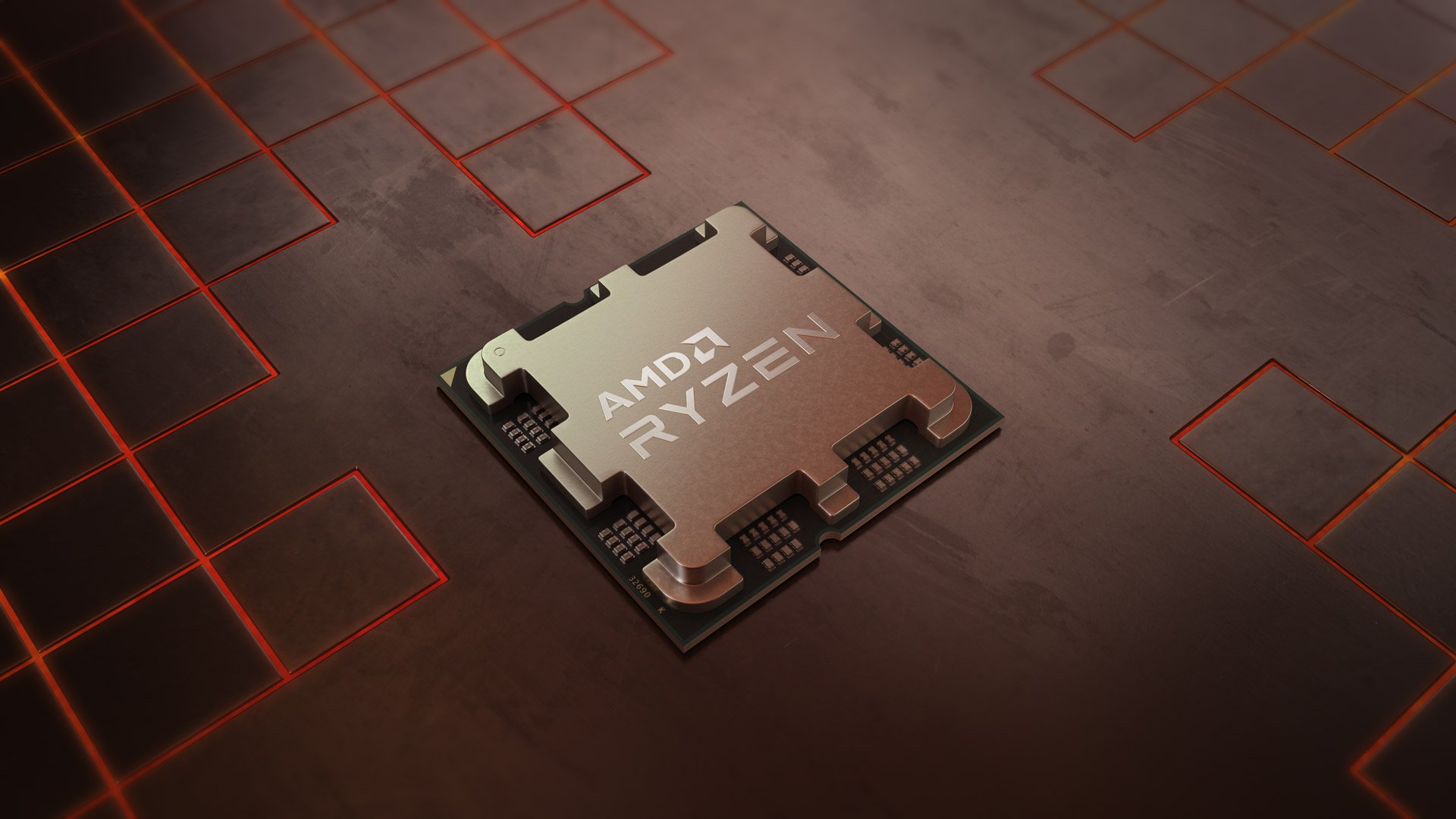
The evolution of AMD Ryzen processors
Posted by Stefan on 2022-09-06
The AMD Ryzen processors are designed for the mid to high-end range and are grouped into the Ryzen 3, Ryzen 5, Ryzen 7 and Ryzen 9 classes. AMD follows the market leader Intel, which groups its Core i series (Intel Core i3, Core i5, Core i7 and Core i9) identically.
The AMD Ryzen processors were first introduced by AMD in Q1 2017. They are the successor to the not particularly successful AMD Bulldozer processors. The latter were manufactured using an outdated manufacturing process and could not keep up with the competing products from Intel. AMD lost a large portion of its desktop processor market share during this period.
The AMD Ryzen processors were first introduced by AMD in Q1 2017. They are the successor to the not particularly successful AMD Bulldozer processors. The latter were manufactured using an outdated manufacturing process and could not keep up with the competing products from Intel. AMD lost a large portion of its desktop processor market share during this period.
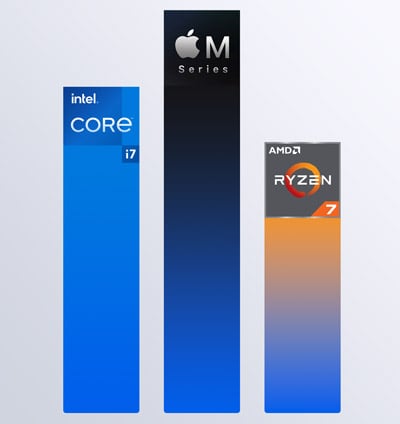
Most popular processors in the first half of 2022
Posted by Stefan on 2022-07-05
In the past we had repeatedly written about our most popular processors. Since this format was quiet popular, I would like to continue this today and introduce you the most popular processors in the first half of 2022.
With more than 2 million page views per month, CPU-Monkey is one of the biggest comparison sites for processors and is currently available in 16 languages.
With more than 2 million page views per month, CPU-Monkey is one of the biggest comparison sites for processors and is currently available in 16 languages.
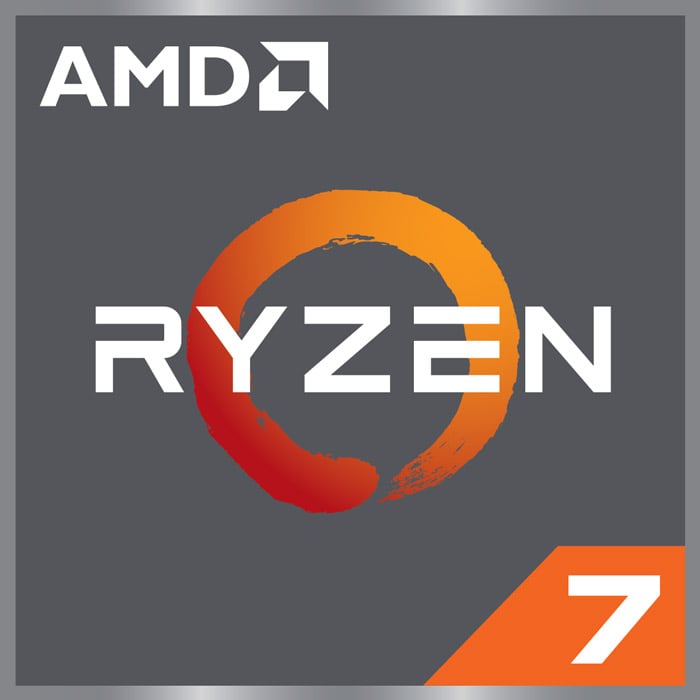
AMD Ryzen 5 7600X and AMD Ryzen 7 7800X are coming in September
Posted by Stefan on 2022-06-20
After we published a performance assessment of the AMD Ryzen 9 7950X last week, the well-known AMD leaker Greymon55 has now posted more informations via Twitter.
He predicts the first four models of the new Zen 4 desktop generation, which AMD would like to present at the end of 2022. There is also an alleged release date of September 15, 2022.
He predicts the first four models of the new Zen 4 desktop generation, which AMD would like to present at the end of 2022. There is also an alleged release date of September 15, 2022.

AMD Ryzen 9 7950X - Cinebench R23 Benchmark projection
Posted by Stefan on 2022-06-10
We give you a preview of AMD's new Zen 4 desktop processors and calculate the performance of the AMD Ryzen 9 7950X top model for the new AM5 socket. The performance data and other technical details come directly from the press kit that AMD released as part of its Financial Analyst Day on June 9, 2022.
Up to 15 percent more single-core performance and 35 percent more multi-core performance of the 16-core model are realistic !
Up to 15 percent more single-core performance and 35 percent more multi-core performance of the 16-core model are realistic !
Description of the processor
The AMD Ryzen 7 5800X is an 8-core desktop processor with SMT support. The processor can therefore process up to 16 threads by assigning two computing tasks to a core at the same time. Since "gaps" occur again and again in arithmetic operations, these are already "filled" with the instructions for the next arithmetic operation. This can greatly increase the speed of a processor.As the successor to the AMD Ryzen 7 3800X, the AMD Ryzen 7 5800X relies on the new AMD Zen 3 cores, which operate under the "Vermeer" design. They are characterized by increased computing power per cycle (IPC). The tube performance per cycle is approximately on the level of Intels 10 nm future solutions such as the Tiger Lake mobile processors (already available). In addition, the not yet available Rocket Lake processors should have the same IPC as Tiger Lake, but these are still manufactured in a 14 nm process.
On the other hand, AMD manufactures the AMD Ryzen 7 5800X at TSMC in an improved 7 nm manufacturing process. This process enables the clock frequencies to be increased while at the same time energy consumption is manageable. Nevertheless, the 8-core processor is specified with a TDP of 105 watts. Since the processor has an open multiplier, it can be easily overclocked. The real consumption or the waste heat of the CPU is then above the TDP. Cooling solutions that can dissipate 150 to 250 watts are recommended for overclocking.
128 GB DDR4-3200 RAM (overclocking via a D.O.C.P. profile possible) is still supported. The main memory can be operated via at least two modules in the so-called dual-channel mode, in which two memory channels are used at the same time. The dual-channel mode doubles the theoretical memory bandwidth of the processor.
Popular comparisons
back to index




